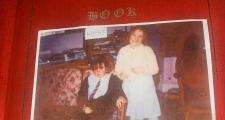‘Memory work must be led by children and young people’

Care leavers who were left with no photographs of their childhood have welcomed a new set of recommendations that advise children's homes on how to keep digital life stories.
Research from the universities of East Anglia and Oxford sought to "get ahead of the curve in relation to potential widespread rollout of digital services in children’s state care".
The team has produced a set of recommendations for children's care providers to follow after examining the rollout of a Digital Life Stories programme in an English local authority.
CaringLife was the first of its kind to be implemented at scale in the UK and sought to offer a "digital place to access memories in a secure way".
Researchers outlined how profiles of children and young people were created by social workers and linked to carers, allowing content to be uploaded and moderated.
Children and young people were able to add memories themselves in the form of photos and documents. In the event of a change of placement, access rights ended and a new set of carers were linked, ensuring continuity.
The study has been welcomed by one care leaver, Nichola Kerr, who said: “It’s refreshing and positive to see researchers and professionals now recognising the emotional cost of memory loss for care leavers.
“For too long, our voices were seen as anecdotes rather than evidence. My hope is that this will turn into practice and positively impact the care experience community.”
Digital Life Story Work (DLSW) is becoming more common in children's services as technology improves the security around personal data.
There are now private spaces where children and their carers can upload content from their time in state care.
Little more than a decade ago it was the norm for children to leave care at 18 with no record of their early lives, or for photos to be redacted and material removed from care files.
Nichola, whose story recently featured in PSW, had to embark on a lengthy battle to find any remnants of her childhood.
She says: "For many of us, the loss of our stories wasn’t just a glitch – it was a form of erasure. Getting this right now is a matter of justice.”
A common block to helping children in care compile scrapbooks is GDPR legislation. Staff in children's homes can be concerned about confidentiality, and the potential for records to be misused or go astray.
Nichola adds: “I understand the need for GDPR; however, this has too often been used as an excuse to justify erasure of records and to protect authorities, not in the best interest of the child or young person.
“Memory work must be led by children and young people, not just done to them. They should be actively involved, at their pace, and it should continue into adulthood. We are care leavers forever – not just until we turn 18.”
The researchers behind the paper published in the British Journal of Social Work state: “Safeguarding memories is worth investment... this so important it must be done optimally."
The team have issued the following guidance for care providers:
1. DLSW should be flexible and person-centred
2. DLSW should provide children and young people with somewhere to begin future storytelling
3. There is no ‘bad time’ to start DLSW, it should start early using everyday opportunities
4. DLSW should begin in the present; this helps to secure memories
5. Content uploading should involve children and young people’s participation choices
6. Children and young people should be constantly offered participation choices
7. DLSW should record all aspects of everyday experiences, both positive and negative
8. Commissioners of DLSW should ensure training and support is available for children and young people, caring adults and others involved
Nichola said the guidance is a “solid starting point” towards ensuring children can make memories in the same way as those who grow up with their birth parents. However, she warned: “There must be clarity around access rights after 18 and a legal duty to preserve memories for 100 years – not just up to age 18 or five years after. There also needs to be clear identification of who is responsible for storing and protecting these memories.”
Acknowledging that it is "early days for these platforms" the researchers say discussions need to be held and sharing agreements reached ahead of widespread commissioning.
"Digital Life Story Work (DLSW) is more likely to be optimal when it is flexible and person-centred, provides future storytelling prompts, starts early, begins in the present, involves children, and constantly offers participation choices.”
In addition, the researchers recommend that DLSW records all aspects of everyday experiences and is backed by appropriate training and support.
